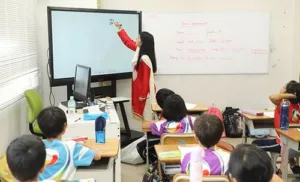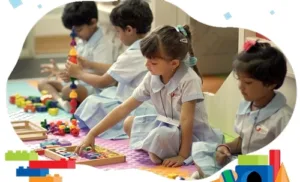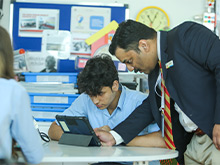Download our FREE Academic Calendar now! 📚 Start your child’s journey to success.
Assessment in secondary school is an important aspect of a student’s educational journey. It involves more than just exams and tests and includes various methods and strategies to evaluate a student’s progress, understanding, version, and capabilities. The multifaceted concept of assessment plays a significant role in shaping a student’s growth and development.
This blog will explore what assessment means for students and discuss its pivotal role in secondary education. It will also look at its impact on student learning and the various methods employed for student assessment.
What does assessment mean for students?
Assessment is a tool that measures the understanding, skills, and performance of students in a specific subject or field of study. It acts as a reflection of their strengths and areas that need improvement. Additionally, it allows students to evaluate themselves and grow. This approach makes them active learners rather than passive recipients of information.
Importance of Assessment in Secondary School
1. Measuring Progress
The importance of assessment in education is like a checkpoint on your educational map. It assists you with perceiving how far you’ve come and how much further you want to go. Whether it’s a pop quiz or a final exam, these assessments let you know what you’ve learned and what you still need to deal with.
2. Identifying Strengths and Weaknesses
Assessments aren’t just about getting a score; they uncover your strengths and weaknesses. They show you where you succeed and where you could require additional assistance. This knowledge is priceless for self-awareness and improvement.
3. Feedback for Growth
Feedback from assessments acts as a kind of progress chart. When you get feedback on your work, you can utilize it to refine your skills and information. It’s an approach to transforming setbacks into stepping stones.
4. Motivation to Learn
Knowing that you’ll be assessed can be a strong inspiration. It urges you to focus in class and study consistently. This also motivates you to take part in your education actively. Assessments in school keep you alert, aware, and anxious to learn.
5. Responsibility
Students and teachers are both held accountable via assessments. Students are answerable for their learning, and educators are responsible for viable teaching. This shared responsibility guarantees that education stays on track.
6. Curriculum Improvement
The importance of assessment assists educational institutions in improving their educational program. When they see patterns of strengths or weaknesses in students’ performance, they can make essential changes to enhance the learning experience.
7. Preparation for the Real World
In reality, we frequently face assessments in different structures – job interviews and certifications. Secondary school students’ assessments set you up for these challenges. They teach you time management and critical thinking – skills you’ll need throughout your life.
How does assessment affect student learning?
1. Encouraging Self-Reflection
Assessments urge students to consider their learning process. When they accept their grades and feedback, they have a chance to think about what worked out in a good way and what might have been done any other way. This self-reflection is a crucial stage in the learning process, as it empowers students to become more self-aware learners.
2. Motivation Boost
Assessment in education, when done well, can be a strong inspiration for students. Knowing that there’s an approaching test or assignment can push students to draw in with the material more actively. Like a little nudge that encourages them to focus in class and look for help when required.
3. Retention of Knowledge
Regular assessments assist students with retaining information better. When they review and revise for tests or quizzes, they reinforce what they’ve learned in class. This course of retrieval strengthens their memory. This makes it easier to recall information when required.
4. Identifying Learning Gaps
Assessments also help educators identify learning gaps in the classroom. If a significant portion of the class struggles with a particular topic, teachers can adjust their teaching methods or provide additional support to address these gaps. It’s like a GPS guiding you to your destination by highlighting the roadblocks along the way.
Methods used for student assessment
1. Quizzes and Tests
One of the most traditional ways of assessing students is through tests and quizzes. These assessments come in various flavors, from multiple-choice questions to essay tests. Tests and Quizzes are convenient because they permit teachers to measure how well students have retained the material. They likewise furnish students with an amazing chance to show their knowledge.
Tip: To make the assessments more powerful, it’s a brilliant idea to give students feedback after completing them. This assists them to understand how they went wrong and how they can get to the next level.
2. Projects and Presentations
Assigning projects and presentations is a brilliant method for evaluating students’ understanding of a subject as well as their capacity to apply that information in a practical setting. These assessments energize creativity and critical thinking. Additionally, they simulate genuine situations where students might have to communicate their ideas effectively.
3. Homework and Assignments
Homework and assignments are ongoing assessments that help students reinforce what they’ve learned in class. These tasks can be in the form of reading assignments or written essays. They enable students to freely practice and apply what they have learned independently.
Tip: Regularly reviewing and discussing homework in class can help identify common misconceptions and clarify challenging topics.
4. Peer Assessment
Peer assessment involves students evaluating the work of their peers. This method helps students develop critical evaluation skills and encourages collaboration and a deeper understanding of the subject matter. It’s like a mini-learning community within the classroom.
5. Observations and Class Participation
Sometimes, it’s not all about written assessments. Observing students in the classroom and assessing their participation can provide valuable insights into their engagement and comprehension. Are they asking questions? Are they actively contributing to discussions?
6. Portfolios
Portfolios are collections of students’ work over a specific period, showcasing their growth and development. They can include essays, artwork, projects, and more. Portfolios offer a holistic view of a student’s abilities and progress.
Tip: Encourage students to reflect on their work and explain how it demonstrates their learning journey.
7. Online Assessments
With the advent of technology, online assessments have become increasingly popular. These can include online quizzes, discussion forums, and even video submissions. Online assessments provide flexibility and can be particularly useful in remote or hybrid learning environments.
Conclusion
The significance of assessment in secondary school cannot be overstated. It serves as a compass directing teachers and students on their educational journey. It sets clear objectives and equips students with the skills and mindset required for future achievement. In the unique universe of education, assessment stays a cornerstone. It guarantees that learning remains a significant and evolving cycle for secondary school students.
Frequently Asked Questions
How to Create Student Assessments?
Creating practical assessments involves:
● Setting clear objectives.
● Aligning assessments with learning outcomes.
● Choosing appropriate Assessment for students’ methods.
● Providing detailed rubrics for grading.
What Are Some Strategies to Improve Student Learning?
Strategies to improve student learning include
● Providing timely feedback.
● Promoting active learning.
● Fostering a growth mindset.
● Encouraging peer collaboration.
● Creating a supportive learning environment.
What Are the Principles of Assessment?
The principles of Assessment in education include:
● Validity (assessing what you intend to assess).
● Reliability (consistent results).
● Fairness (equitable assessment for all students).
● Transparency (clear expectations and criteria).
What Are the 3 Activities of Assessment?
Assessment activities typically encompass three stages: setting learning goals and expectations, collecting evidence of learning, and using assessment outcomes to inform teaching and learning practices.



































